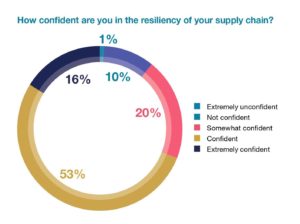Ivalua Named A Leader In The 2025 Gartner Magic Quadrant™ For Source-To-Pay Suites Report
View Report
Ivalua Named A Leader In The 2025 Gartner Magic Quadrant™ For Source-To-Pay Suites Report
View Report
Blog »

by Alex Saric
This content is part of the latest WBR Insights Report: Transforming Procurement: Embracing Digital Innovation & Driving Sustainability
As the world has been readjusting to the ripple effects caused by the pandemic in the past two years, successful enterprises have developed contingency plans to protect their supply networks from future shocks to the supply chain.
Over half of the heads of procurement in our survey (53%) are currently confident in the resiliency of their supply chains, while 20% of the respondents are somewhat confident. Notably, only 11% of respondents said they were not confident or extremely unconfident.

Taking Steps to Increase Resiliency
Procurement leaders are under increased pressure to improve supply chain resilience. This is being driven by consumer demand for greater transparency, compliance demands, tougher regulatory enforcement, and the growing emphasis on CSR. In this regard, monitoring supplier performance, compliance, and the flow of materials from the lowest tier of supply to the end consumer is key to promoting end-to-end visibility.
53% of our respondents identified bringing some critical activities in-house for greater visibility as a key objective in the next 12 months, for improving supply chain resiliency. Resilient organizations are also capable of pivoting rapidly and adapting to disruptions without significant increases in operational costs. This level of flexibility can be achieved with a comprehensive technology stack, a roster of alternative suppliers, and ready access to key data.
According to our survey, heads of procurements are emphasizing increasing innovation internally and with suppliers (52%), diversifying their supplier base (46%), and investing in new IT upgrades to improve legacy architecture (45%) as priorities for the next 12 months.
Future-proofing Procurement Against Supply and Demand Shocks
The current pandemic is just one of a myriad factors that could bring disruption to supply chains in the future. To meet major challenges such as trade wars, cyber-attacks, natural disasters, and international conflict, heads of procurement must take steps to reduce supply chain risk and provide future-proofing against supply and demand shocks.
Heads of procurement should be investing in powerful and sophisticated data analysis tools to help understand the supplier landscape for effective future-proofing. Establishing a strategic approach to supplier management is also essential to gain a deeper look into the multi-tier supply chain and carefully assess each supplier to identify their potential risks.
The majority of heads of procurement (65%) are investing in AI and RPA technologies to future-proof their organizations. Meanwhile, 44% of respondents are standardizing processes across geographies, and 40% are reducing risk through strategic supplier fragmentation.
How is your organization future-proofing against demand and supply shocks?
The vast majority of heads of procurement in our survey are currently confident, somewhat confident, or even extremely confident in the resiliency of their supply chains. Over half of our respondents identified bringing some critical activities in-house for greater visibility as a key objective in the next 12 months, to improve supply chain resiliency. By bringing some critical functions in-house, an organization can significantly reduce its reliance on others, while increasing innovation strengthens supplier relationships and provides greater capability to all stakeholders.
With regard to future-proofing their organizations against future shocks, 65% of our respondents are investing in automation with AI and RPA technologies. Almost half are reducing risk through strategic supplier fragmentation, or standardizing processes across geographies to create a central strategy.

Alex has spent over 15 years of his career evangelizing Spend Management, shaping its evolution and working closely with hundreds of customers to support their Digital Transformation journeys. As CMO at Ivalua, Alex leads overall marketing strategy and thought leadership programs. Alex also spent 12 years at Ariba, first building and running the spend analytics business as General Manager. He then built and led Ariba’s international marketing team until successful acquisition by SAP, transitioning to lead business network marketing globally. Earlier, Alex was a founding member of Zeborg (acquired by Emptoris)where he developed vertical Procurement applications. He began his career in the U.S. Cavalry, leading tank and scout platoons through 2 combat deployments. Alex holds a B.S. in Economics from the U.S. Military Academy at West Point and an international M.B.A. from INSEAD.
You can connect with Alex on Linkedin